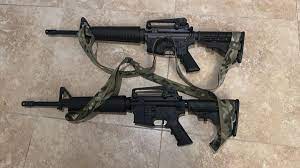
Ammunition and NFA Firearms
The National Firearms Act (NFA) was basically unveiled in 1934 beneath Key management Franklin D. Roosevelt’s administration like a respond on the growth of brutal crime measures dedicated with firearms. The act was applied with the goal of regulating and manipulating the financial transaction, acquisition, and shift of specific firearms and add-ons deemed too hazardous for community use. Over time, The National Firearms Act has become subjected to several amendments and alterations to feature a bigger assortment of firearms. In this article, we shall jump on the fundamentals of your own National Firearms Act, what it really really controls, and just how it factors weapon managers and retailers across the usa.
1. What exactly is the National Firearms Act?
The national firearms act (NFA) is truly a national guidelines that manages distinct firearms and bonuses that may be regarded as too dangerous or are considered military services- and regulations-enforcement stage. The act was released in 1934 as being a legislation directed at curbing legal offenses regarding utilizing particular firearms. Some of the firearms and accessories managed through the NFA contain quick-barreled rifles, swift-barreled shotguns, equipment pistols, dangerous products, suppressors, and then any other tools (AOWs).
2. NFA Rules
Beneath the NFA, pistol consumers and retailers need to spend a taxes and distribute a software about the Bureau of Alcoholic drinks, Tobacco, Firearms, and Explosives (ATF) before they might obtain, exchange or make any among the aforesaid firearms and add-ons registered from the NFA. NFA taxation are gathered throughout the National Firearms Act Stamp (NFA Stamp), which folks must connect with the application form type well before submitting it to the ATF. Individuals should also go through track record record inspections and give fingerprints within the application approach. By using these restrictions, the NFA aspires to keep up tabs on who offers firearms and add-ons that current a large threat to community protection.
3. NFA Exemptions
Its not all the firearms and additional items fall under the legislation in the National Firearms Act. As one example, firearms which are typically useful for putting on functions, like shotguns, rifles, and handguns, usually do not call for an NFA stamp or tax before obtain or change. In addition, collectible firearms (manufactured well before 1898) and firearms manufactured for army use may also be exempt in the NFA guidelines.
4. NFA Influence on Gun Customers and Dealers
The National Firearms Act directly has an effect on weapon users and merchants by regulating the purchase, ownership, and move of certain firearms and accessories regarded as too dangerous for available open public use. Before receiving any handgun licensed from the NFA, the patient must send a software kind (ATF Type 4), shell out a income taxes, experience fingerprinting, and move forward via a thorough backdrop look at. Handgun sellers also have to experience comprehensive National Firearms Accreditation (FFL) research and adhere to all authorities and express restrictions to get qualified to promote NFA-certified firearms and extras.
In A Nutshell:
To sum it up, The National Firearms Act is truly a federal government rules that aims to manage and handle the promoting, possession, and exchange of several firearms and add-ons regarded too hazardous for open open public use. To accomplish this, the NFA requires weapon proprietors and dealers to spread an application type (ATF Create 4), shell out a fees, proceed through fingerprinting, and proceed through an rigorous background analyze. Even though the NFA has experienced some critique throughout the years, it has shown to be an efficient legislation in curbing the development of brutal crimes linked to firearms by regulating the purchase, thing, and shift of firearms and elements that induce an essential threat to open public protection.